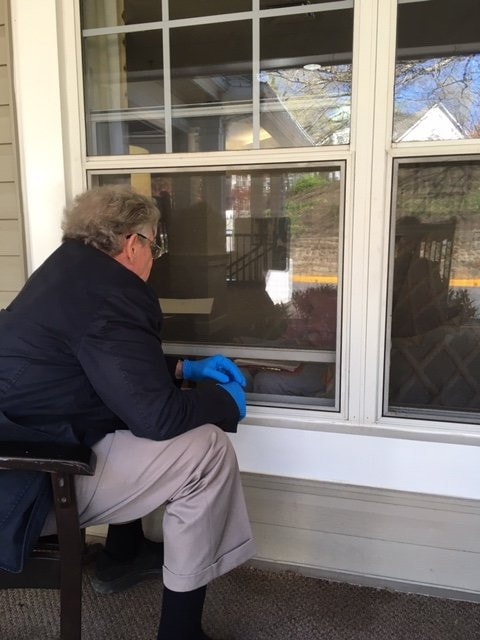This is the second part of an account I wrote as Redfin’s CEO about what it has been like to run a publicly traded company hit hard by the pandemic. This part discusses how, as the crisis deepened, we scrambled to sell assets and make up for employees’ lost bonuses. The first part, published Monday, was about our dawning recognition of the pandemic. The third, to be published tomorrow, is about how a big furlough affected our culture, and where we stand now. We were now two weeks into the crisis. Having closed our offices, virtualized our service and raised $110 million, we now addressed a series of risks, in a business flipping houses, in the mortgage market, and in protecting employees’ health. We pick up on Tuesday, March 17, a few days after the investor Henry Ellenbogen had called Redfin about an investment when our stock was in free-fall.
March 17, Shedding Risky Assets: Sell, Sell, Sell
One reason our stock was falling was because some investors had begun betting that our involvement in a risky new business called institutional buying, or i-buying, would catch us in a cash crunch. Our main business is brokering the sale of a customer’s home. But we occasionally act as an i-buyer, buying the customer’s home outright with our own money, in what is known as an instant offer. Any home we can’t sell becomes a liability; a large number of homes we can’t sell would become a toxic liability.

An investor featured in Michael Lewis’s “The Big Short” had begun to bet against i-buying in the second half of 2019, warning, “God help you if there’s a recession, because you’re going to lose money hand over fist.” We felt we’d been more careful than the companies this investor was worried about. Our CFO had limited us to owning about $100 million in homes, when some competitors likely owned almost ten times that. Now we wondered if we’d been careful enough.
On Monday, March 16, Redfin was near our $100 million in the homes we owned, and there were still more we had offered to buy. The week prior, we’d drastically lowered the price we were willing to pay for most homes, thinking that fewer people would take us up on it. But more did. Our customers had even more anxiety about the market than we did. By Monday, our chairman, Bob Mylod, called with a simple message: “get out.”
This is when I learned how hard it is for a company to stop doing anything completely. Redfin employed people whose only job was to buy houses. Before telling them to stop, I felt careful about saying what that would mean for their careers. So I said we needed to limit risk, and then was dismayed that on Tuesday, March 17, we finished up a few offers already in progress. “Why won’t they stop?” I said on a call with Adam Wiener. It was at that point that he stepped in with a simpler message: “The next person who signs an offer for Redfin to buy a house will be fired.”

We were the first major i-buyer to stop buying houses, but now the challenge was to get as many homes off our books as possible. People in our i-buying business, who had to know their jobs depended on a business they were now dismantling, worked night and day to cancel offers on homes we hadn’t yet bought, and to renovate every home we needed to sell. Any contract that still had a cancellation option was canceled; the only exception we made was for homeowners in a jam.
Two days later, we’d already clawed back millions in cash. That Friday, a woman emailed me, angry that we wouldn’t go through with one of our purchases. I looked in her file and found out she herself was a real estate investor. She and Redfin were two sharps straddling a downturn, with a deal half done. I told myself that if our roles were reversed, she wouldn’t have even dreamed of completing the purchase. Then I called her. I explained that we were only going through with purchases for people selling their primary residence in distress; our job now wasn’t to liquidate other investors’ portfolios.

She was crying. She said she couldn’t sleep. She said she couldn’t afford two mortgages. I could tell that English wasn’t her first language; she said she’d made a mistake when describing herself as an investor in our online forms. I found myself asking for her “word of honor” that her condo wasn’t an investment.
She gave me her word. I told her we’d buy her home, then had to call my colleagues so we could send her a check. Her Redfin contact knew her well, and had already confirmed she’d been renting the place out, as an investor. I’d been played. I sent the team an email:
I know you’ve held the line all week, and saved the company from great risk as a result.
I had to do that with only one home, and I didn’t. I’m sorry.
The home cost us $430,000. It’s still on our books.
March 17: Hardship Pay for Agents
That same Tuesday, March 17, we told our agents we would temporarily increase their salary. Their annual salary had ranged from $8,000 to $50,000, depending on tenure and location, but at least for the month of May, it would range from $35,000 to $70,000.
In 2019, the median income for a Redfin agent after at least a year on the job was $97,000, with about 70% of that coming from sales and sales-activity bonuses. But we knew that our agents’ incomes would start declining in May, based on declines in demand starting in March.
We also knew that offering hardship pay for May would obligate us to offer it in any month with very low sales; our board met at 7 a.m. that day to approve the cost, which we estimated at $4.7 million per month. It wasn’t an easy decision to approve when we’d started to hemorrhage cash.
It was also hard because we might have to lay people off; but our head of real estate operations, Scott Nagel, argued that the remainder would still need a living wage. I told the board I was canceling executive bonuses, and eliminating my salary for the year. The board asked for an executive session, kicking off the management team for a private chat with me. I prepared myself for a lecture on frugality.

But instead they told me they’d already talked in advance about eliminating their own cash payments for the year, a move that was made at other companies in which Bob Mylod was involved. I started to say thank you, but the clock had struck 8 a.m., and most of them had other calls to join, with other companies in a jam. Their Google Hangout boxes disappeared one by one; I was the last person to leave. I didn’t do anything for a few minutes after that.
March 30: Should We Shut Down Entirely?
On Sunday, March 29, I got a message from Jamie Derouen, who led a Houston team of Redfin agents. She had stopped meeting clients herself, because her husband had a pulmonary condition. But her agents were still hosting home tours, sometimes two or three a day. She said that some agents broke down after a tour, wondering if the meeting had been worth the risk.

She wanted to know how I, safe at home, would feel about meeting customers right now? She wanted Redfin to offer virtual service only. We’d already canceled all open houses, limited the number of customers on any tour to two, and virtualized our service wherever possible. If an agent was vulnerable or had a vulnerable family member, we paid another Redfin agent to handle the meeting. Wherever shelter-in-place laws applied to real estate, we told employees we’d fire anyone who kept showing homes.
But the night before, on Saturday, March 28, the Department of Homeland Security had re-classified real estate as an essential service; we now expected most states to follow suit. This would let us photograph an empty home, or open the door for a customer to tour it. As I talked to Jamie about how we could still do that safely, I didn’t like the way I sounded.
By 8:51 that Sunday night, I’d sent a note back suggesting the “drastic, mind-boggling step” of shutting down entirely. This would almost certainly require an 80% layoff of field personnel, or more. At 10 a.m. the following Monday we were meeting with our senior field leaders about a shut-down.
We expected them to argue for eliminating customer meetings, but their argument was the opposite: other brokerages were already cleaning our clocks, flouting the rules that we followed. Overwhelmingly, they said, agents wanted to work, and they knew safe ways to let a customer into a house or to photograph a house.
I said that classifying real estate as an essential service was “such a crock.” I’d been on tours with customers dreaming about a fancy pool; what did that matter now? Have you been on a tour lately, Scott asked? “The people we’re serving now aren’t the ones who want to sell a house. They’re the ones who have to, because someone got sick or lost a job. They need the money; they need to move on with their lives.” We’d have to call to tell them we’d no longer list their home.

We decided to stay open, but on Tuesday, March 31, we gave employees the option of a coronavirus furlough, offering money and health-care benefits for people who wanted or needed to opt out. Seventy two people took us up on the offer. That same day, a person wrote on Twitter:
@GovInslee @glennkelman My mother is an agent for Redfin real estate and she was unknowingly exposed to COVID-19 last week at work. In the meantime she has exposed hundreds of Americans by going to the grocery store and continuing to do her “essential” job. Please reconsider.
It was hard to read, but I was relieved Scott had talked me out of a total shut-down, which would have required us to furlough virtually everyone, leaving our customers in the lurch. On Friday, an agent emailed us this image of a closing, of a woman in a long-term care facility, separated by a window from a closing attorney wearing blue gloves:

March 26 – April 3: The Mortgage Market Starts to Come Apart
On Friday, April 3, at 5:45 p.m. Eastern Time, a man in Boston owning more than a million shares of Redfin sent a note to me, our chief financial officer and our head of investor relations.
I just wanted to make sure you knew that a big part of the bear case on Redfin is the belief that you are not going to be able to sell the mortgages on your balance sheet and are going to get stuck with a large $ amount as your forward-flow counterparties walk away from their obligations. No need to reply to me with any specifics.
The email’s author was worried about our mortgage business. Redfin not only helps people buy houses, but loans people money to buy houses. Wall Street had started to bet against our stock on the belief that we could get stuck with loans that investors were supposed to take off our hands.
Under normal circumstances, within fifteen days of issuing a loan, we sell the loan to someone else, be that a bank or an investor or a government-sponsored entity like Fannie Mae. We make a few thousand dollars, and the new owner of the loan gets the money from mortgage payments. So long as we do all the paperwork right, it’s someone else’s problem if the homebuyer stops paying her mortgage. But it was getting harder for us to find anyone else to take loans off our hands.
The jumbo loans were the first to go. These are the big loans, typically above $500,000, especially popular for buying homes in coastal cities. The investors who buy these loans had started to freak out. I only realized something was wrong at 10:58 a.m. on March 26, when I was asked to review an email warning our agents that the jumbo-loan market was falling apart. Five hours earlier, jobless claims had their first monster spike, from 282,000 the week before, to 3.3 million, a 1,173% increase.

At 11:05 a.m., our head of mortgage, Jason Bateman, notified execs we had only nine jumbo loans on our books, and had already lined up a buyer for each one. This was a relief. The only loans we were now issuing were backed up by the ultimate risk-absorber, the U.S. government, which buys modestly sized mortgages from companies like Redfin through Fannie Mae and Freddie Mac. Our job now was just to meet homebuyers, help them pick the right loan, verify their income and assets, and then send the loan to Fannie and Freddie. I felt relieved that the government was still standing behind us with a huge catcher’s mitt.
I was wrong. A day later, on March 27, the U.S. CARES Act passed, a giant relief package that let homeowners stop paying their mortgage for a year, regardless of whether they lost their jobs. The rate at which Americans asked for forbearance on their loans increased fifteen-fold in two weeks. Many businesses that were supposed to collect mortgage payments stopped taking on any new loans.
And without this collection service, no investor, not even investors backed by the federal government, could take a loan. If one of our customers lost her job right after closing and asked for forbearance, we’d be stuck with her loan, which meant we would have given someone, say, $400,000 to buy a house, with no expectation of getting any money back for a year.

We typically issued about 200 loans a month, and now wondered what would happen if we couldn’t sell these loans. Our general counsel, Anthony Kappus, asked if anyone at Redfin even knew how to send a homebuyer her mortgage bill, “like, every month?” “Yes,” our head of mortgage said. “Someone did it once.” Now, taking a risk for even a tiny amount of time was something we had to think about.
We’d already lost nearly a million dollars in revenues because loan prices had dropped; the investments we’d put in place to offset a drop had stopped working because the government was buying mortgage-backed securities at inflated prices. Even for some of the largest lenders, this unprecedented market distortion was nearly fatal. It took Redfin until April 3 to shift our risk onto bigger banks.
It has been nearly two months since the federal government made the extraordinary promise to spend an “unlimited” amount on mortgages to keep the housing markets open. But with nearly 15% of Americans suddenly unemployed, cracks are still showing up in the system.
This is what I wish the well-meaning people who eliminated predatory lending in 2008 and who now fought for mortgage forbearance in 2020 would understand. Both reforms were necessary and good, but both create a vacuum in which working-class Americans now can’t get a mortgage. No business wants to go a year without getting payments, or to become the villain in another foreclosure crisis. Many just stop taking a chance on the people who need it the most.
As credit disappears for broad swathes of Americans, the main home-buyers out there are increasingly the people with the most cash, not the first-timers who could really benefit from less home-buying competition and the lowest rates in history. It was like this in the Great Financial Crisis. It’s like this in every crisis. In bad times more than the good, the strong prey on the weak, and inequality widens.
On Wednesday: the third and final installment, on the furlough, the un-furlough and what now?
In case you missed it: the first installment.

 United States
United States Canada
Canada